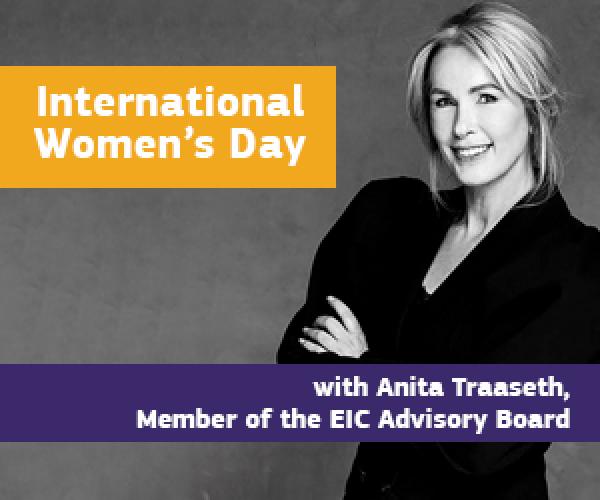Anita Krohn Traaseth is a Norwegian business executive, writer, former CEO of Innovation Norway and EIC Advisory Board Member. One of Scandinavia's most successful businesswomen knows from personal experience the importance of resilience and role models. When she was in high school, she wanted to become a writer, but a teacher demotivated the choice, criticising her skills. Anita never felt discouraged by the comments. Quite the opposite. And the proof was published in 2014, when the first book Anita wrote: Godt nok for de svina – Good Enough for the Bastards - became a Norwegian bestseller. Today she combines her writing passion with a successful business career and shares often personal experiences to inspire other women to pursue their dreams. On International Women's Day, we sat down with Anita Krohn Traaseth to discover her journey.
When you began your career many years ago, did you ever imagine that you could be a leader in a male-dominated industry?
I was lucky when I started my work-life as a Trainee for IBM in 1996. At that time, we were 14 people selected, 50% women/men. I understood there that, as long as you choose sales in the ICT industry and deliver the numbers, closing the deals, I would have the same possibilities for new roles and respect as men. I've also had great male leaders supporting my career development in the tech world, leaders like Sabby Gill and Hans Daniels in Hewlett-Packard.
Who inspired you along the way, and why/how?
I grew up in Norway with a strong female Prime Minister in the '80s, Gro Harlem Brundtland. She demonstrated that everything is possible and achievable for women. But the key has been work itself, all the different tasks and areas to learn from, the great colleagues and leaders I've met and that inspired me with possibilities to make a change.
Let's continue to look back in time. When you were a teenager, you wanted to become a writer, but your teacher sent you in the opposite direction. Was it here that your resilience appeared for the first time in your life?
I believe the resilience came way before. I grew up with a mother with a bipolar disease, and she was open about it even in the '70s. I lost her to suicide when I was 19 years old. Her openness, love, affiliation, and freedom developed my resilience from an early stage. I have been very lucky to experience posttraumatic growth after the loss of my mother.
Against all your teacher's predictions, your first book Good Enough for the bastards became a national bestseller in 2014. I read in a magazine that this expression, often used by your father, became a motto for your career and family life. Can you explain the story behind it?
Since I was a young girl, my father always told me when I was struggling with homework or other things that "it's good enough for the bastards"- it was an informal saying pointing out that I need to set my own limits, enough is enough. Do your best, and if it's not the best, learn from it and do it better next time. Move on.
How did the business world enter in your life and got mixed with your passion for writing?
I've always enjoyed writing, but only in 2012, when I became the MD of Hewlett- Packard Norway, I started to write a blog, and writing became a more integrated part of my work life. Since then, I've published three books and became a columnist writing about leadership, change and innovation at Aftenposten, the Norway's largest newspaper.
We also read in an interview that, when you were working on your first job as a trainee for IBM, one of your instructors said that you acted like a man because you raised your opinion in several meetings. An assumption that still exists in some teams or meetings dominated by men. In your opinion, what should be changed in this sense?
Yes, there are still stereotype expectations on how female leaders should act, behave, dress, and speak. Being different is always a challenge. It's important to acknowledge that it's a fact, but even more important is to find confidence and develop your own leadership style. The best way to contribute to change is to be part of the change yourself.
As a female leader, what has been the most significant barrier in your career?
Myself. Do I dare to apply for this job? Do I have the courage to speak up in this situation? Am I a good enough mother, wife, sister, friend? All these doubts and questions will come. Let them go, ask for advice, learn from others, and tell yourself that you are more than good enough!
Which advice can you give to women starting their career and facing gender bias?
- Acknowledge that there is gender bias.
- Ask for advice on how to handle different situations when it gets frustrating.
- Find your own way, be the change and go all the way from a trainee to CEO.

DISCLAIMER: This information is provided in the interest of knowledge sharing and should not be interpreted as the official view of the European Commission, or any other organisation.

